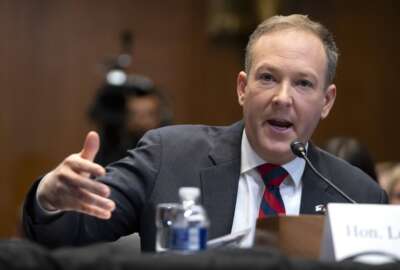What can USPS learn from TRICARE in funding retiree health care costs?
As lawmakers consider efforts to shore up the Postal Service's financial footing, there's still widespread disagreement over whether the current requirement for the...
The U.S. Postal Service has long maintained that requiring it to set aside funding for future retirees’ health care costs in the form of fixed multibillion-dollar annual payments is a drag on its dire financial condition.
In fact, the agency has defaulted on billions of dollars in such payments in recent years and, absent reform legislation from Congress, will do so again when the next payment comes due in October.
But as lawmakers consider efforts to shore up the agency’s financial footing, widespread disagreement remains over whether the current prefunding requirement is fiscally responsible, as Rep. Blake Farenthold (R-Texas) argued during a House Oversight and Government Reform subcommittee hearing Thursday, or an “onerous mandate” only required of the Postal Service, as Rep. Stephen Lynch (D-Mass.) contended.
TRICARE also prefunded
The hearing, chaired by Farenthold, examined the $100 billion in unfunded liabilities clouding the agency’s balance sheet. Future retiree health costs make up nearly half of the future costs for which the agency has not yet set aside sufficient funding to pay.
Postal officials and employee unions argue they’re the only agency required to prefund retiree health care costs. But while the Postal Service might be in a precarious situation it’s far from unprecedented, Farenthold suggested. He pointed to a requirement that the Defense Department’s Defense Health Agency also prefund future payments for its Medicare-eligible TRICARE recipients.
“I just wanted to have them scratch that talking point off so we could talk about some other things,” Farenthold said of his decision to invite DoD officials to testify at the Postal Service hearing.
(Story continues below chart)
|
|
Pension |
Retiree health |
Workers’ compensation* |
|
Total liability |
$306.2 billion |
$95.6 billion |
$17.2 billion |
|
Fund Balance |
$286. 9 billion |
$47.3 billion |
$0 |
|
Percentage Funded |
94 percent |
49 percent |
0 |
|
Unfunded Liability |
$19.3 billion |
$48. 3 billion |
$17.2 billion |
| *Workers’ comp follows a pay-as-you-go payment system | |||
However, Democrats on the committee were quick to shoot down what they suggested was an “apples to oranges” comparison.
For one thing, the Postal Service is a self-sustaining agency that doesn’t receive money from Congress. DoD, on the other hand, receives annual appropriations that support its prefunding requirement, said Lynch, the committee’s ranking member.
For their part, DoD officials said while the department does receive annual funding from Congress, it wasn’t provided any extra money to make the required payments. “The DoD topline was not increased by the amount of the payment into the trust fund,” said Robert Moss, the Defense Health Agency’s budget and resource management chief. “So, DoD was told, ‘You still have your essential funding level and from that you will start to prefund the trust fund.'”
The Postal Service’s prefunding requirement is also more aggressive than DoD’s, Democratic members argued.
The Government Accountability Office’s chief actuary, Frank Todisco, told the committee that while funding targets for both DoD and USPS are designed to meet 100 percent of future obligations, the Postal Service’s schedule may be more “ambitious” because payments are frontloaded in the first 10 years.
In fact, thanks to that frontloaded schedule, the Postal Service’s unfunded liability for retiree health care costs is actually much smaller than DoD’s. The trust fund for Medicare-eligible TRICARE recipients is currently only about 39 percent funded, while the Postal Service has made nearly half its required payments.
Rep. William Lacy Clay (D-Mo.) said Republican lawmakers were trying to hold the Postal Service to an unfair standard.
“To hold this agency to one standard and not other agencies … nobody’s talked about dismantling the federal government when we’ve got $17 trillion in national debt,” he said.
USPS — like TRICARE — wants more integration with Medicare
Still, there is at least one area where USPS officials hope to draw from the lessons of TRICARE: better integrating retiree health coverage with Medicare.
Health care costs for military retirees are primarily covered by Medicare with only supplemental coverage provided under the TRICARE For Life program. Health care costs for postal retirees, however, are primarily covered by the Federal Employees Health Benefits Program, even though postal employees — and USPS as their employer — pay into Medicare.
In fact, about 10 percent of postal retirees are not enrolled in Medicare Part A, which covers hospital stays, and about 24 percent aren’t enrolled in Part B, which covers doctor visits and preventive services.
The Postal Service’s proposed solution would make Medicare the primary provider for USPS retirees, while postal-only plans within FEHBP would continue to provide wrap-around coverage.
This “would virtually eliminate the future unfunded liability” for health care costs, said Jeffrey Williamson, the Postal Service’s chief human resources officer and executive vice president.
RELATED STORIES:
Even as postal losses shrink, USPS continues call for agency overhaul
Postal reform bill heading to Senate floor
USPS says overhauling health benefits key to postal reform
Copyright © 2025 Federal News Network. All rights reserved. This website is not intended for users located within the European Economic Area.





